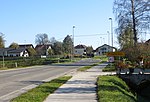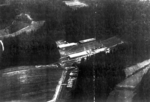The Teharje camp (Slovene: taborišče Teharje) was a concentration camp near Teharje, Slovenia, organised by the Yugoslav secret police (OZNA) after the end of World War II in Yugoslavia. It was primarily used for the internment of Slovene Home Guard prisoners of war, ethnic Germans, and Slovene civilians.
The camp was built in 1943 by German forces and was used as a military camp for Hitler Youth. It had six residential barracks and ten other buildings. The camp was abandoned for a short time after the war, but was reactivated by the Yugoslav communists at the end of May 1945 to accommodate former members of the Slovene Home Guard and others that had collaborated with the Axis, as well as civilians that had fled before the advancing Yugoslav People's Army to Allied camps in Austrian Carinthia. On 31 May 1945, the entire 2nd Assault Battalion of the Slovene Home Guard, headed by Vuk Rupnik, was brought to Teharje, and in the first days of June 1945 approximately 3,000 additional members of the Slovene Home Guard joined them. It is estimated that the postwar authorities executed approximately 5,000 internees of Teharje without trial during the first month or two after the Second World War.A memorial park designed by Slovenian architect Marko Mušič was built on the site of the camp in 2004, where an annual ceremony is held by the Government of Slovenia.




